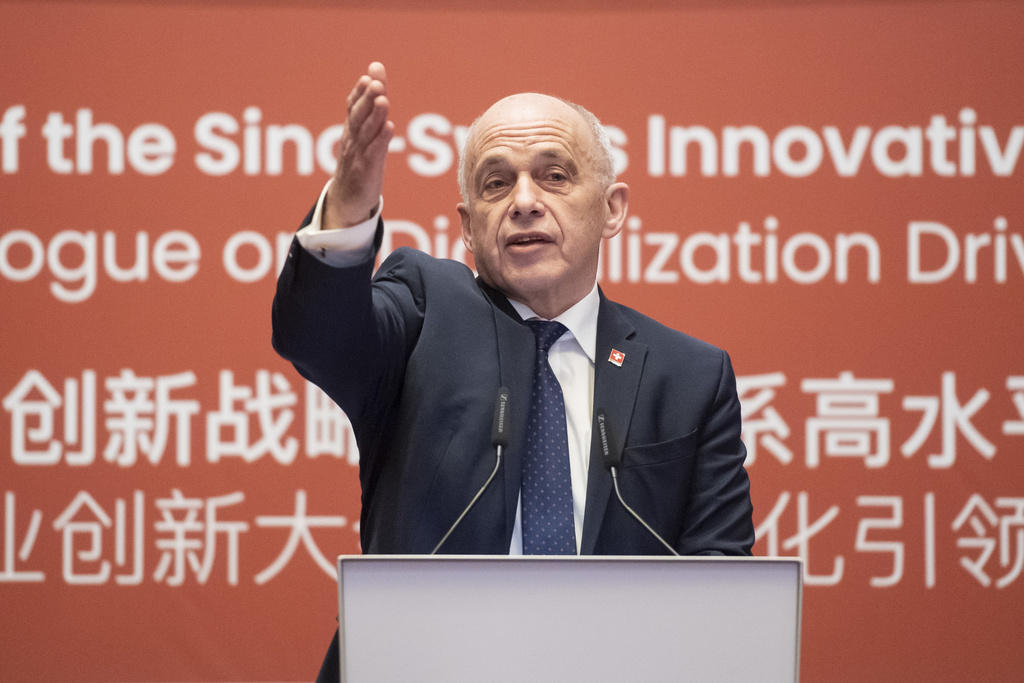
Swiss president defends controversial Chinese project

Ueli Maurer says it’s important for Switzerland to take part in the Belt and Road summit and bring its own values to the table.
As the Belt and Road summit on international cooperation begins in Beijing, Maurer, who holds the rotating Swiss presidency this year, says the project makes sense only if it goes beyond economics and brings cultures together.
“Switzerland is a neutral, independent state. We do what we think’s right. And I can see that through this project the global economy is growing,” he said in an interview with the Neue Zürcher ZeitungExternal link (NZZ) on Friday.
“That creates jobs and security. Where there is prosperity, there are fewer conflicts.”
+ What is the Belt and Road Initiative?External link
China’s President Xi Jinping launched the Belt and Road initiative (BRI) in 2013, but his plan to rebuild the old Silk Road to connect China with the rest of Asia, Europe and beyond has become mired in controversy as some partner nations have bemoaned the high cost of infrastructure projects.

More
How Switzerland lost and regained its Chinese ‘friend’
China has not said exactly how much money will be needed in total, but some independent estimates suggest it will run into several trillion dollars. Western governments have tended to view it as a means to spread Chinese influence abroad, saddling poor countries with unsustainable debt.
Maurer, who is also Switzerland’s finance minister, said he had brought five Swiss principles to the Chinese for the BRI: private capital for private projects, social responsibility, green criteria, transparency and sustainable debt management.
“The problem of the debt trap is one of the points. It’s clear that countries will get into debt. You can’t pay for these projects with petty cash. But you have to make sure that this debt doesn’t exceed future possibilities or turn countries into dependencies.”
Problems and risks
“Criticism is fine,” Maurer continued. “But only criticising is never a solution. At some point you have to decide whether you want to hinder development and progress or take part in it, contribute and have an influence. I think it’s better to play a part and want to change things in a positive sense.”
However, he acknowledged that there were problems and risks connected to China.
“Absolutely. I see problems with sustainability, human rights and environmental pollution. But China’s changing. The government in Beijing is very aware of these problems. But it’s a long process that will take several more decades. Between 400 million and 500 million people have been lifted out of poverty. That’s a start,” he said.
Maurer is one of 40 heads of state to travel to Beijing for the two-day second Belt and Road ForumExternal link, which started on Friday. Russian President Vladimir Putin is also attending, but the United States, which has not joined the Belt and Road initiative, is expected to send only lower-level officials.
As part of his visit, Switzerland and China are set to sign a memorandum of understanding to intensify cooperation on trade, investment and project financing in third markets along the routes of the BRI.
Ultimately, however, Maurer said people shouldn’t set their hopes too high.
“Until now the Belt and Road initiative has been a huge idea. It’s the largest investment project this century. Now, this idea is being made more concrete.”

More
Why Switzerland and China are courting each other

In compliance with the JTI standards
More: SWI swissinfo.ch certified by the Journalism Trust Initiative






























You can find an overview of ongoing debates with our journalists here . Please join us!
If you want to start a conversation about a topic raised in this article or want to report factual errors, email us at english@swissinfo.ch.